
Vietnam & China: Hanoi to Kunming by Rail Itinerary
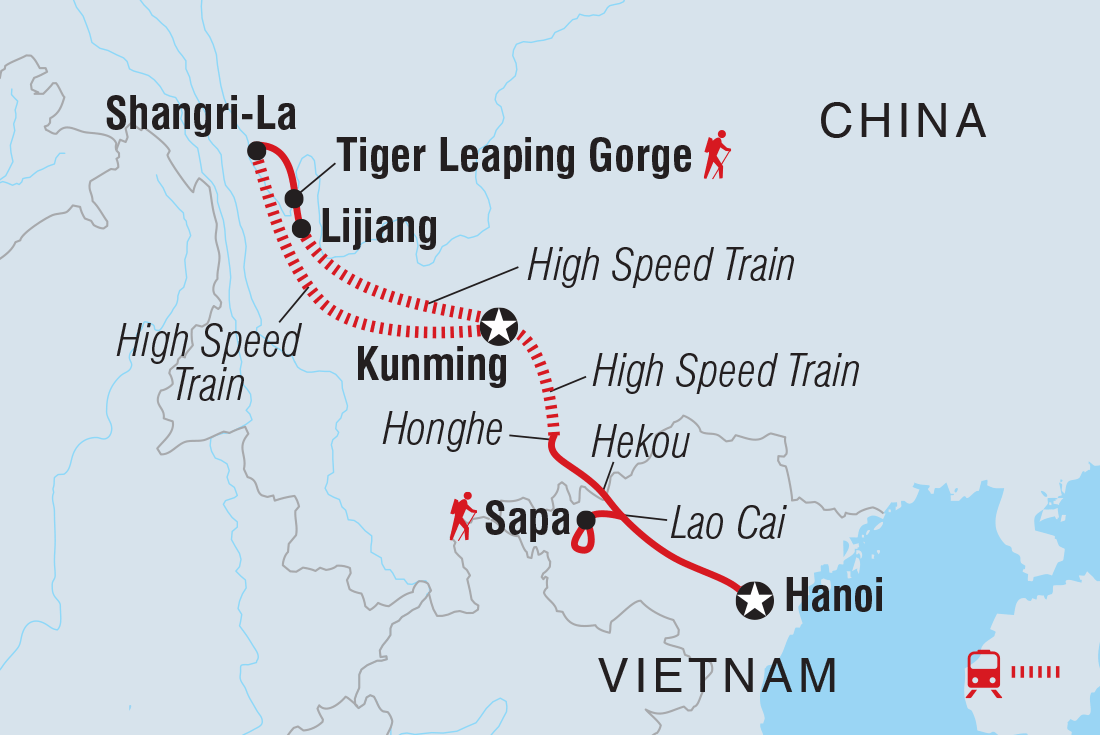


Xin chao! Welcome to Hanoi. Your adventure begins with a welcome meeting at 6 pm at your hotel to meet your leader and fellow travellers. If you arrive early, there’s plenty to see and do in Vietnam's storied capital. You could book the Hanoi Street Food Experience with Urban Adventures to sample local street eats from markets and food carts, take a stroll around Hoan Kiem Lake or explore the Old Quarter lined with shops, imperial temples and French architecture. This evening, maybe get to know your leader and group over dinner.
After breakfast, take a private transfer to Sapa – a misty mountain town on the slopes of the Muong Hoa Valley near the Chinese border. Take some time to relax at your hotel before regrouping for a sunset walk around the town with your local leader. Along the way, visit Sapa Church – built by French colonisers in the early 20th century and seen as a symbol of the town – and learn how the square in front of it has become a cultural hub and gathering place for the ethnic groups in the area. Then, check out the stalls at the night market and dig into a feast of grilled meats, seafood and corn at a local barbecue.
Take a private vehicle to Tan Van Village this morning and lace up your walking shoes for a day hike through Sapa’s iconic rice terraces. With crisp air, paddies that cascade down the hillsides and the chance to meet traditional hilltribe villagers, you’ll soon see why this has become a quintessential image of Vietnam. Before heading back to Sapa town, meet a local H’mong family in their home and share a tasty home-cooked lunch. You’ll arrive back at your hotel in the mid-afternoon, where the rest of the day is free to enjoy a well-deserved rest. For dinner, maybe check out one of the town's many restaurants with your group.
Today it’s time to hit the road to Lao Cai where you'll cross the border into Hekou, China. It's a short drive to the immigration office where you'll say goodbye to your Vietnam leader. You'll clear immigration by yourselves without your leader, and it could take some time, so a bit of patience can go a long way. Say ni hao (hello) to your new China leader who'll meet you once you cross the border, then jump on a private bus to Honghe City where you’ll board your first high-speed train to Kunming – the capital of the Yunnan province. Check into your hotel late afternoon before heading out for an orientation walk. For dinner, you could try over-the-bridge rice noodles – a signature Yunnan dish.
This morning, take a bullet train from Kunming to Shangri-La – an alpine city in the heart of the Hengduan Mountains. The journey is long, but the views (especially on a clear day) of snow-capped peaks, valleys and lakes make it worth it. Then, take a private vehicle to your hotel and join your leader for a walking tour of Dukezong Ancient Town – one of the largest and best-preserved Tibetan settlements in China that dates back to the 7th century. Most of the town was destroyed by fire in 2014, but immense effort has gone into restoring the original architecture – including the 21-m-tall prayer wheel, which is the largest in China and takes at least 10 people to turn. Take your time to wander the cobbled lanes and watch artists create intricate thangka paintings. The square comes alive in the evening with traditional music and line dancing – everyone’s welcome, so feel free to join in!
Today you'll take a private vehicle to the outskirts of Shangri-La to visit Ganden Sumtseling Monastery – the largest Tibetan Buddhist monastery in Yunnan province. Wander halls decorated with elaborate frescoes depicting ancient Buddhist tales, take in the views of the surrounding countryside and enjoy the serenity of the nearby Lamuyangcuo Lake. Then, return to the city where you’ll be welcomed into the home of a local Tibetan family. Learn how to make traditional yak butter tea and share a home-cooked lunch. You’ll also see the family’s scripture or shrine room – a sacred and essential space in Tibetan households used for prayer, meditation and rituals. The rest of the day is free to relax.
Take a private transfer this morning to Tiger Leaping Gorge – a dramatic canyon on the Jinsha River, where legend says a tiger escaped poachers by leaping across the water. Meet your local guide here to begin your hike through the gorge. This is one of the world’s deepest river canyons, with the Jade Dragon and Haba Mountains rising nearly 3800 m above the riverbanks. This trail takes you deep into the heart of it, along narrow switchbacks and cliffside paths with views of the surrounding peaks. Enjoy a well-earned rest this evening at a guesthouse overlooking Jade Garden Snow Mountain. Make sure your camera is charged as the sunsets here on a clear evening are gorgeous! Get a good night’s sleep, as another big day on the trail awaits tomorrow.
Continue hiking through the gorge in the shadows of the mountains. The trail is mostly downhill today, taking you past waterfalls and giant boulders. After finishing the hike, take a private vehicle to Lijiang – a UNESCO World Heritage city home to the Naxi people and several other ethnic groups. Freshen up in your hotel, then join your leader for an orientation walk in Old Town to learn about the city’s role in the Tea Horse Road, an ancient trading route from the seventh to the 20th centuries. Explore the maze of cobbled alleys, canals and traditional Naxi wooden houses. This evening, perhaps head out for dinner with your group and try some traditional Lijiang dishes – how about steam pot chicken or chickpea jelly?
Take a private vehicle this morning to Baisha Old Town on the outskirts of Lijiang. The streets of this sleepy Naxi town are lined with traditional architecture, murals, craft shops and cafes. After walking around, visit a local Naxi family in their home for a Dongba calligraphy class. Dating back to the 13th century, Dongba uses around 1000 pictographic glyphs to represent objects, actions or ideas, and is said to be one of the world's last living pictographic scripts. You have free time for the rest of the day. If you want to explore more, perhaps join an optional bike ride around Lashihai Lake.
Today you'll take a train back to Kunming, arriving in the early afternoon. The rest of the day is yours to spend as you wish. There's plenty to do in Kunming – nicknamed ‘Spring City’ thanks to its mild climate, natural beauty and laidback vibe. Explore manicured gardens and watch locals practising tai chi in Green Lake Park, learn about Yunnan’s ethnic groups at the Village of Ethnic Culture or rub shoulders with university students along Wenlin Street. This evening, maybe head out with your leader and group for an optional farewell dinner and raise a toast to a great adventure!
With no activities planned, your adventure comes to an end after breakfast. You’re free to leave any time after check-out. If you’d like to extend your stay in Kunming, just get in touch with your booking agent ahead of time.
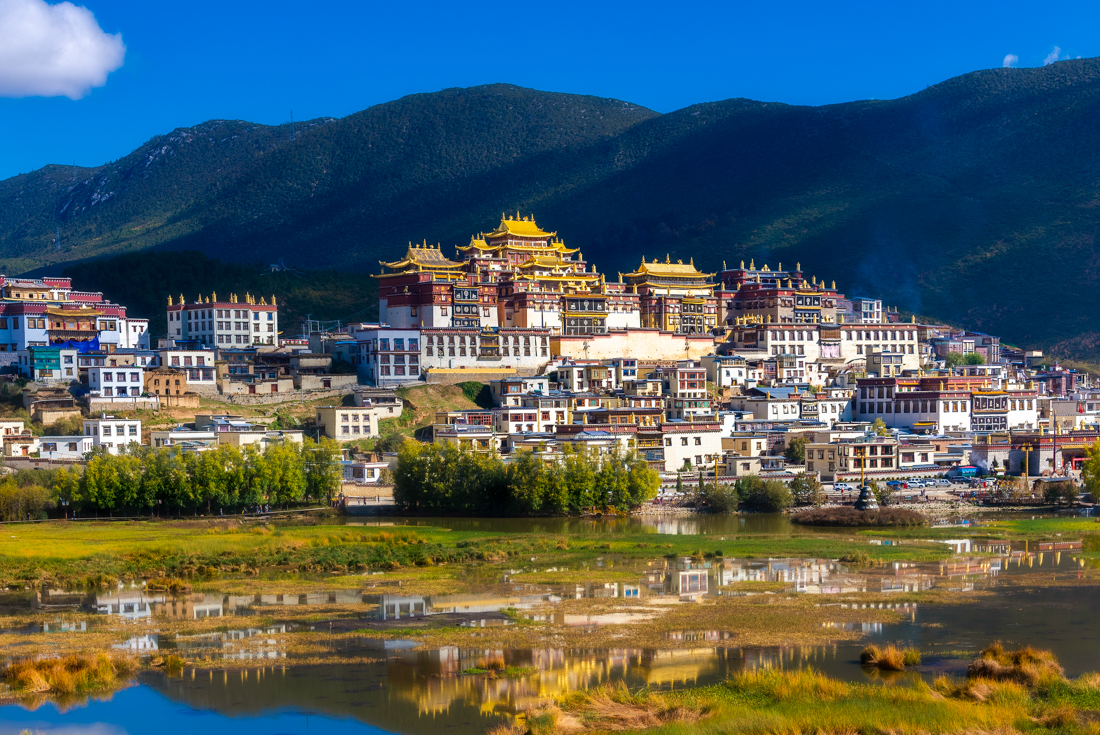
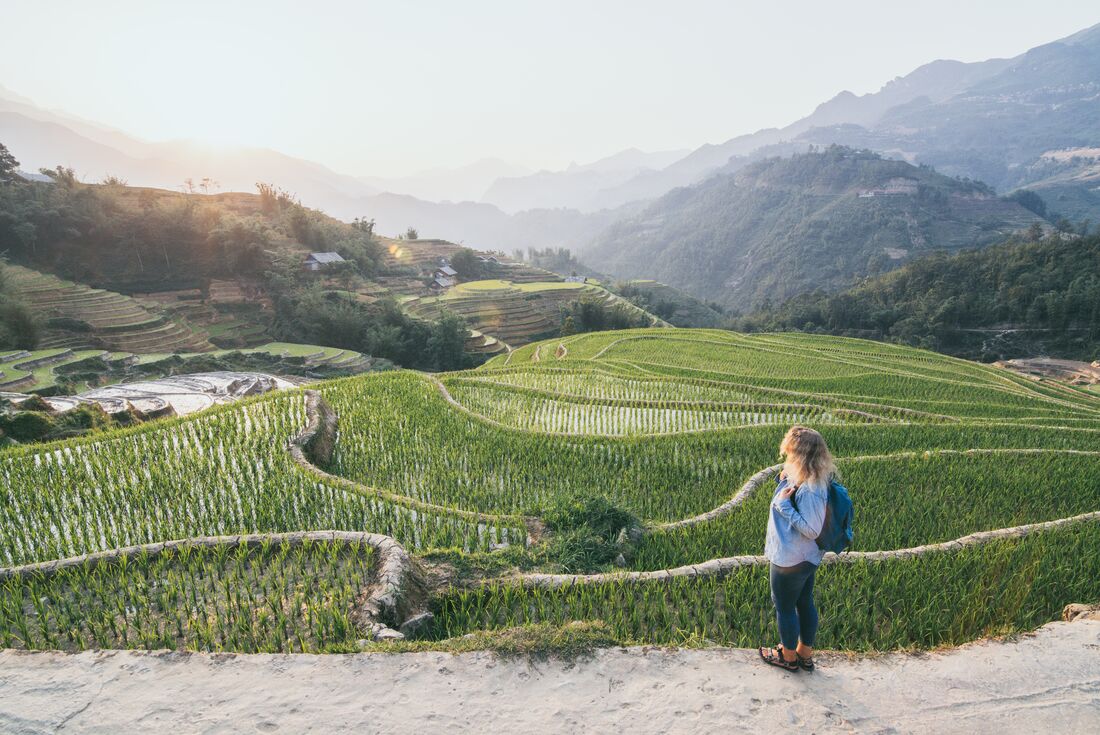
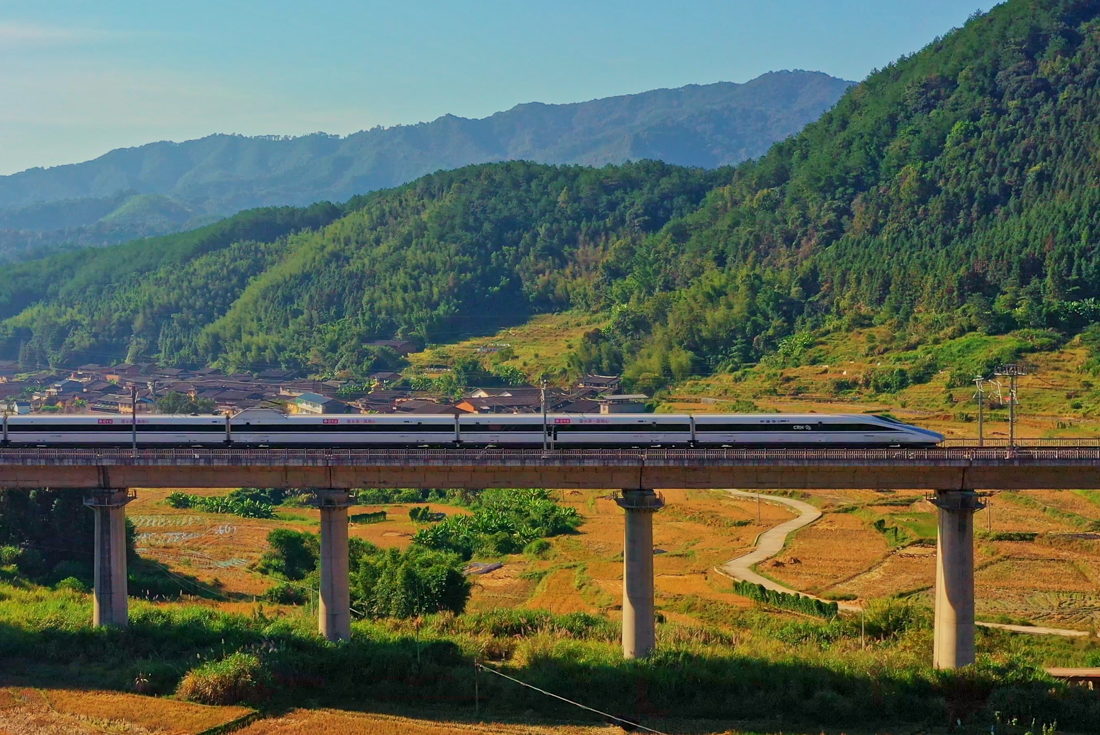
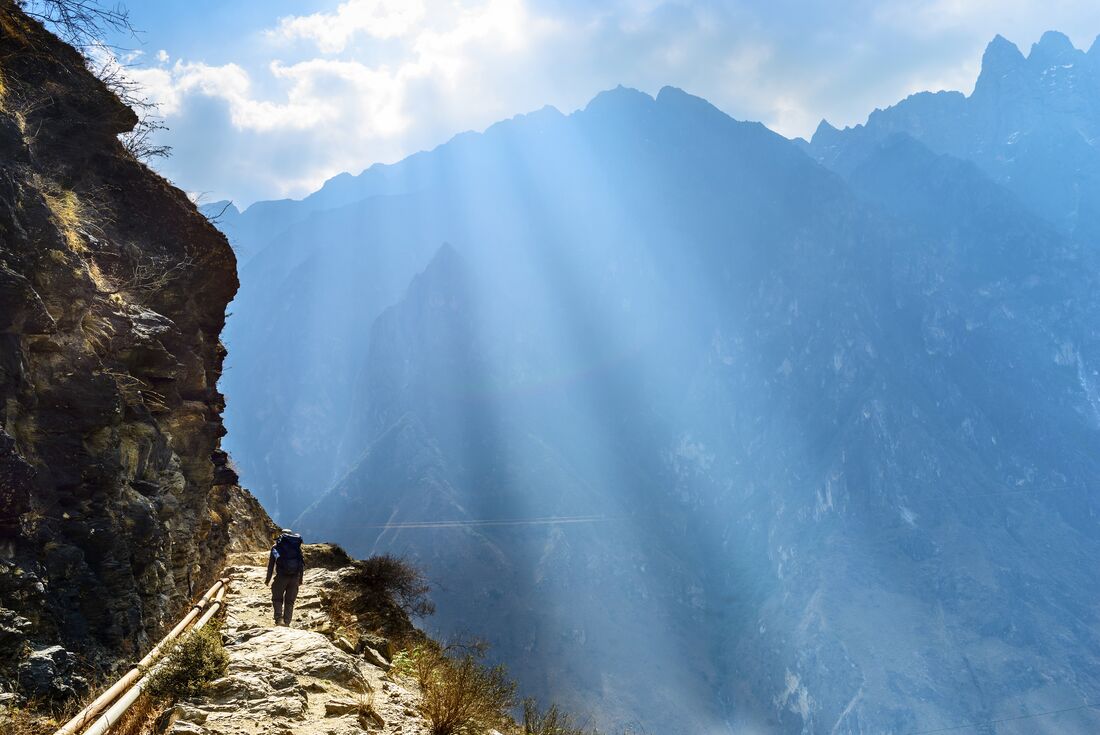
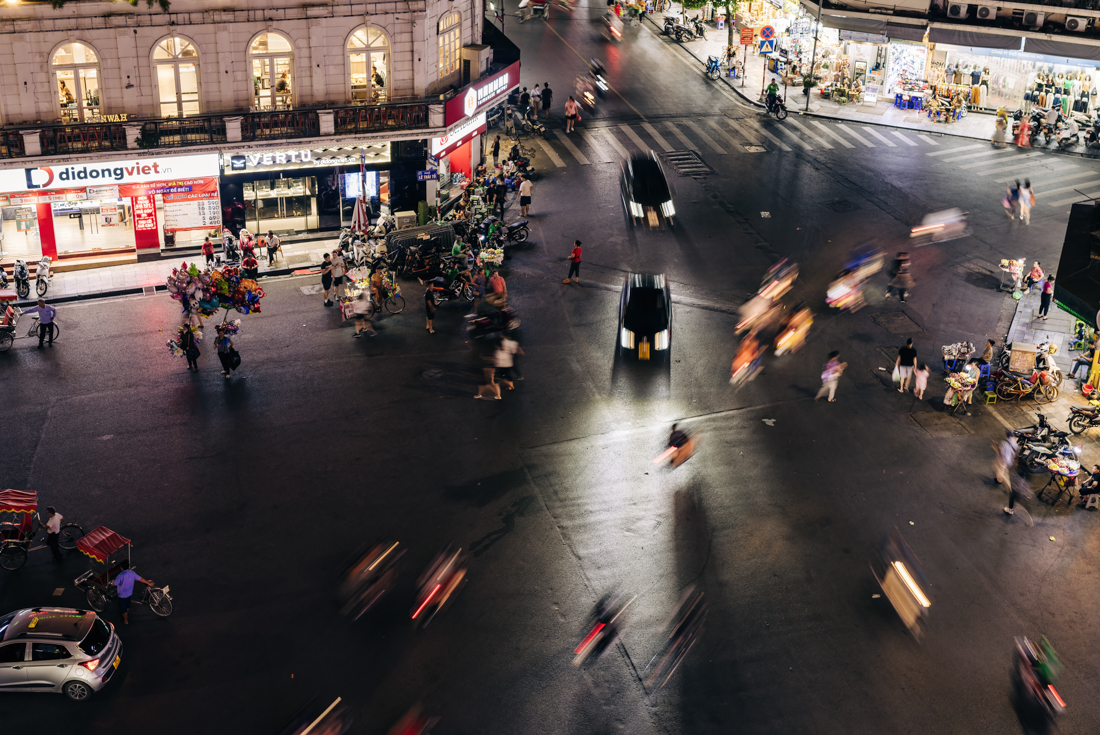
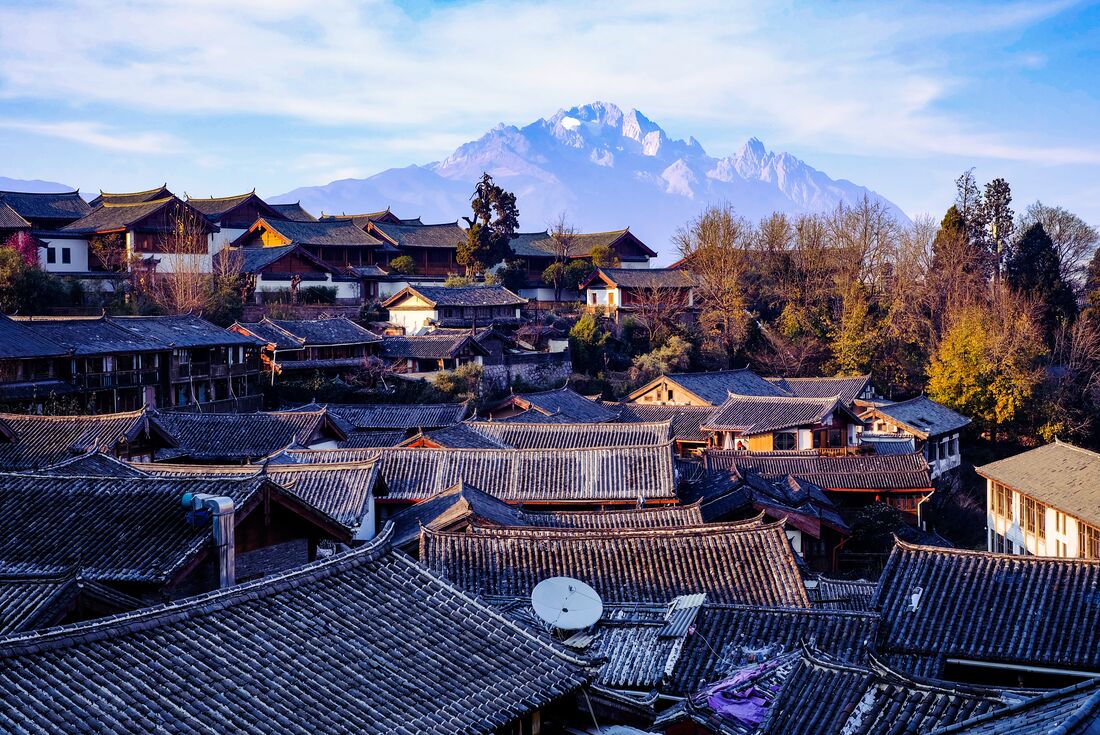
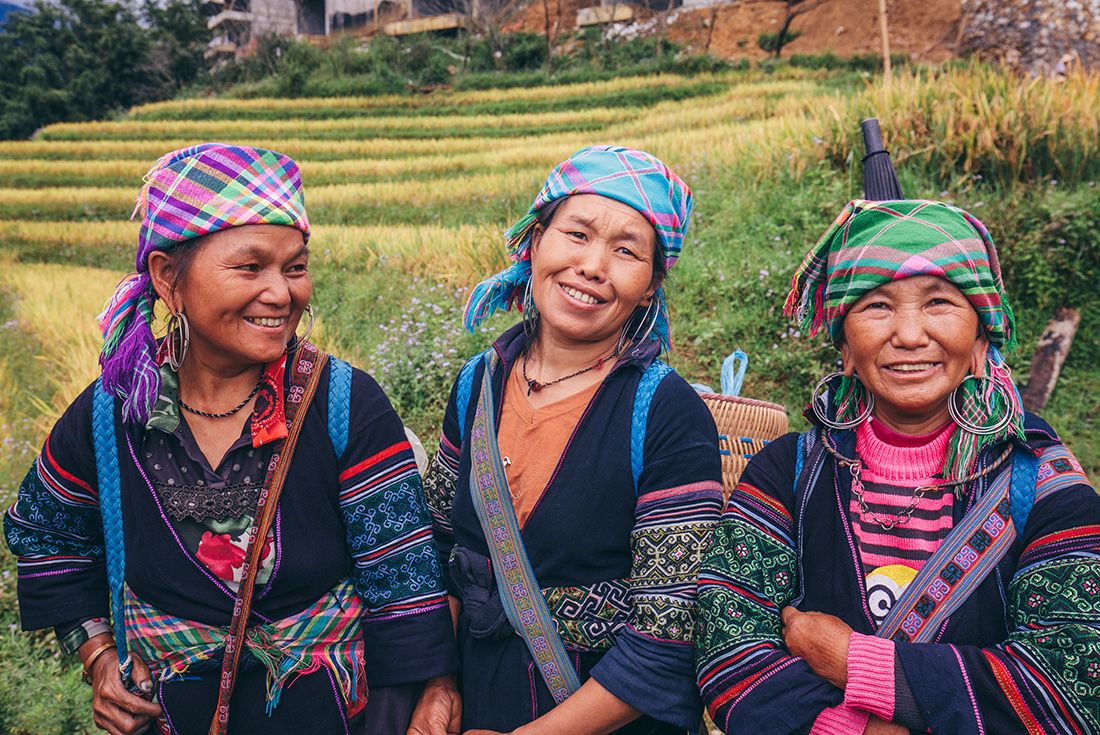
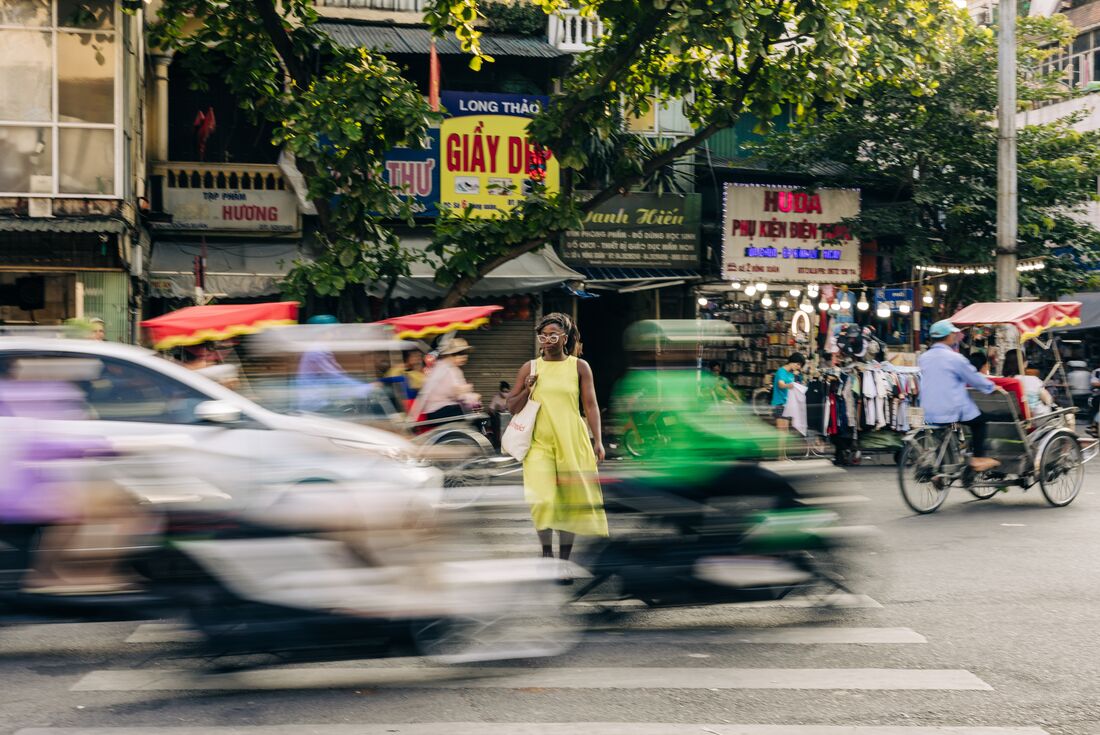
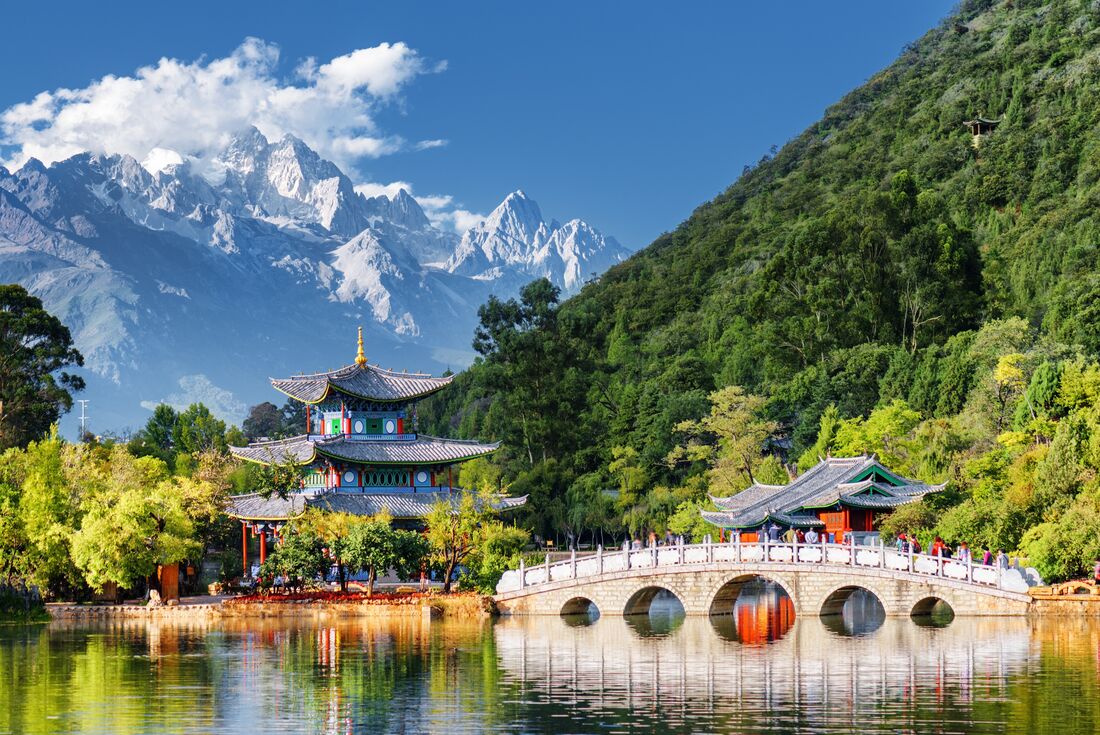
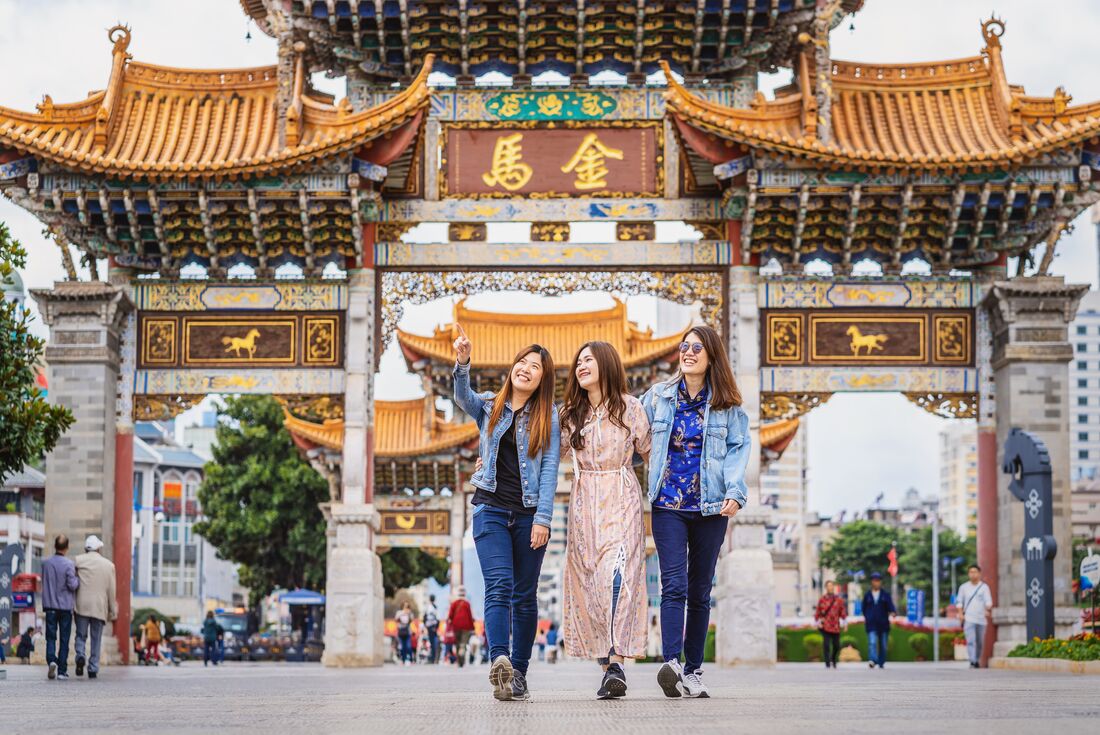
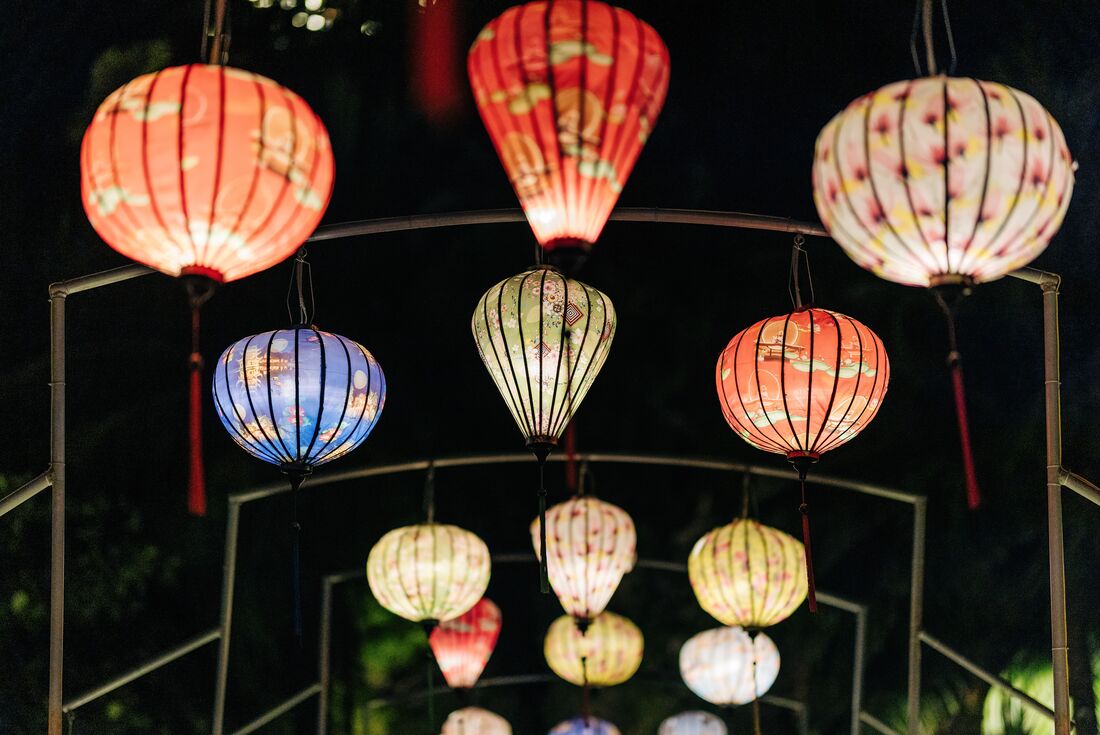
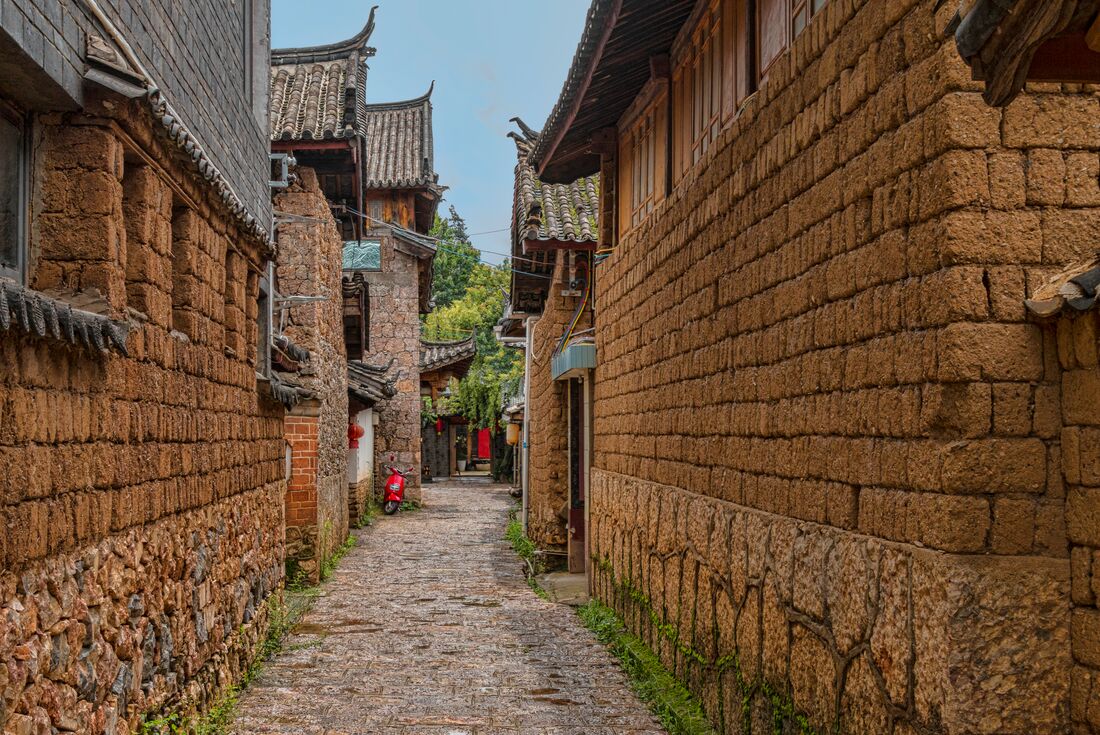
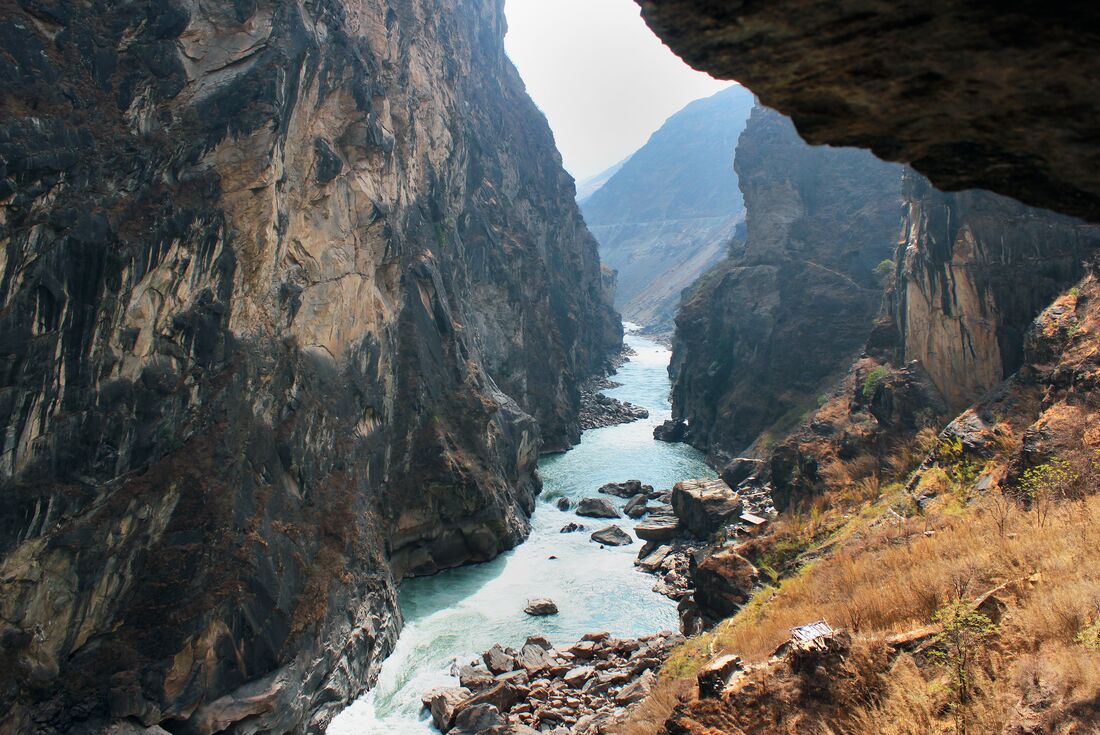
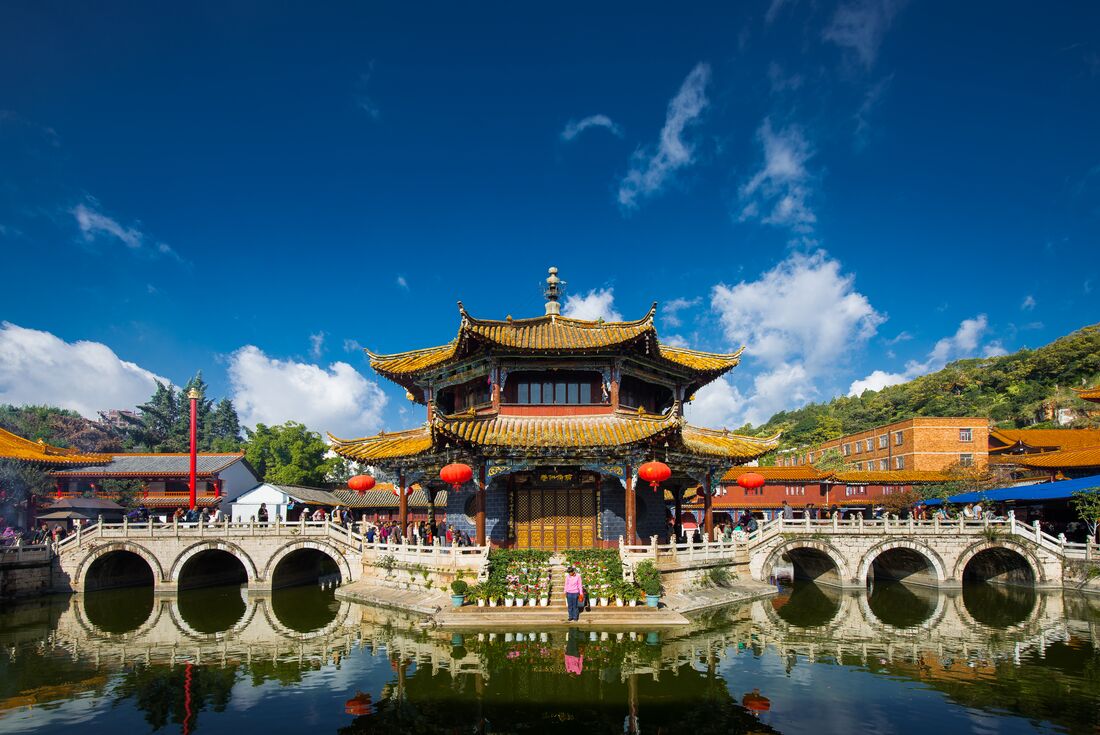
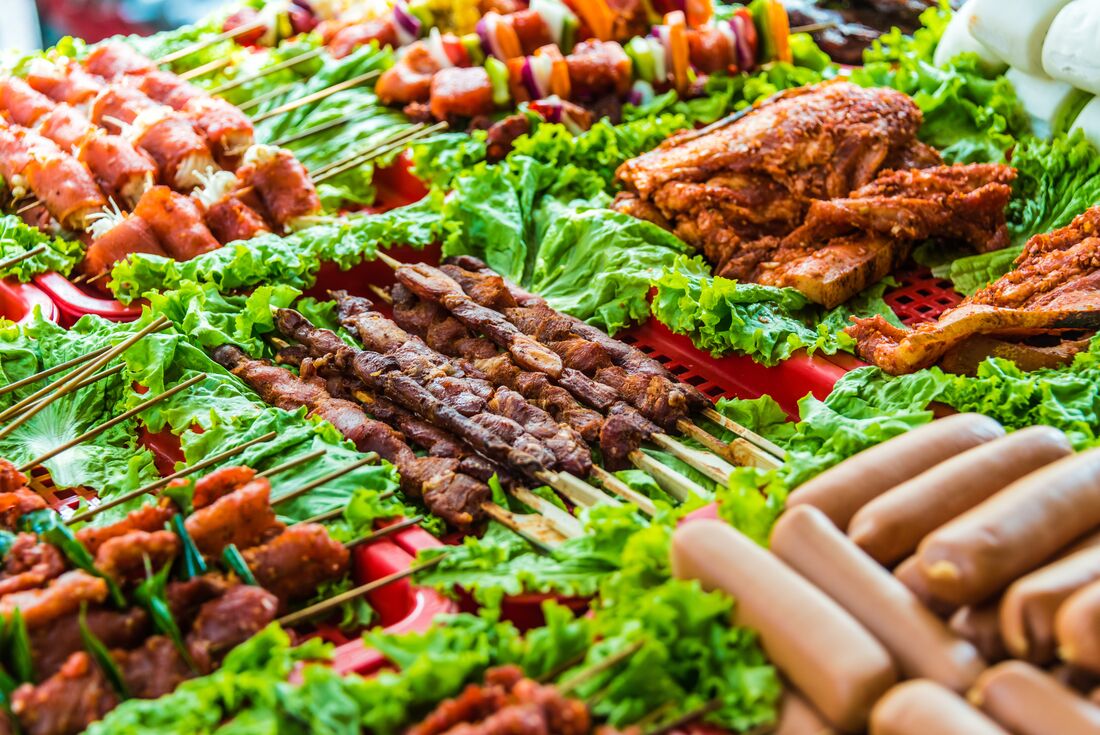
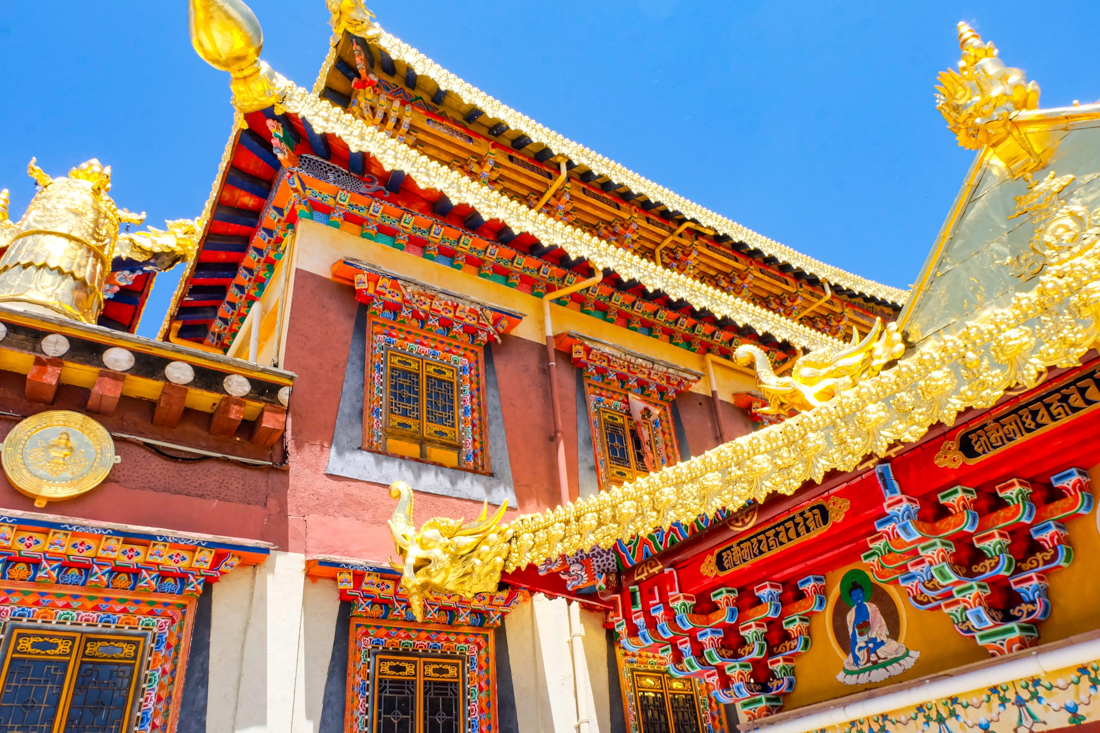
Sapa - Sapa Church
Sapa - Sunset Walking Tour
Sapa - Street Food BBQ Dinner
Sapa - Rice terrace hike
Shangri-La - Dukezong Old Town walking tour
Shangri-La - Ganden Sumtseling Monastery
Shangri-La - Tibetan family with lunch
Tiger Leaping Gorge - Guided trek (X2)
Lijiang - Old town walking tour
Lijiang - Naxi family visit and Dongba calligraphy writing
LIjiang - Baisha old town visit
Hike through Sapa’s famous rice terraces and get to know H’mong culture and traditions over a delicious home-cooked lunch with a local family.
Ride a high-speed train to Shangri-La City to explore the halls, murals and gardens of Ganden Sumtseling Monastery, then learn how to make yak butter tea with a Tibetan family in their home.
Hear the roaring Jinsha River as you hike through Tiger Leaping Gorge – one of the world’s deepest river canyons – where the snowy peaks of the Jade Dragon and Haba mountains rise almost vertically above the canyon.
Visit the historic towns of Lijiang and Baisha, once key stops on the Tea Horse Road, and try your hand at writing ancient Dongba characters with a Naxi family.
Experience one of the world’s best high-speed rail networks, where modern trains reach up to 350 kmh (217 mph) for comfortable and efficient travel across China.
Hanoi Sky Hotel, No. 27 Tong Duy Tan Street, Hoan Kiem District, Hanoi , Hanoi, VIETNAM, Phone: +84 2439382235, Fax: +84 2439382237
Kunming Long Teng Hotel 昆明龙腾大酒店, No 632, Beijing Road, Panshan District 昆明盘龙区北京路632号 (近东风广场), Kunming, CHINA, Phone: +86 87163168999
1. A single supplement is bookable for this trip, subject to availability. Please speak to your booking agent if you are interested.
2. A scanned copy of the personal details page of your passport needs to be sent to your booking agent no later than 40 days before departure in order for us to purchase our train tickets.
3. You will have tour leaders from Vietnam and China accompany you in respective countries and you'll be unaccompanied for the border crossing.
4. Travelling in China will heavily rely upon using local payment apps – Wechat and Alipay for making payments. It’s essential to install them on your phone and have a data package ready prior to your travel. Please read ‘money matters’ in the Essential Trip Information for more details. You shouldn’t rely on credit card for travel in China.
5. While travelling in China, you won’t have access to social media and some websites. You may consider installing a VPN to access those sites and apps. Please check the Essential Trip Information for more details.
6. Please note that there are some prohibited items for trains and flights in China. Please refer to Packing section of the Essential Trip Information for more details.
While we always endeavour to provide the best possible holiday experience, due to the nature of travel and the areas we visit sometimes things can and do go wrong. Should any issue occur while you are on your trip, it is imperative that you discuss this with your group leader or local representative straight away so that they can do their best to rectify the problem and save any potential negative impact on the rest of your trip.
We recognise that there may be times when your group leader or local representative may not be able to resolve a situation to your satisfaction - if this is the case, please ask the group leader or local representative to speak to their direct manager.
You may also choose to provide details in your online feedback, which we ask you to complete within 30 days of the end of your trip. Please do be aware that it is very difficult for us to provide any practical help after the trip is completed, so informing us while still travelling will give us the opportunity to resolve the issue in real-time., For general contact details please use the following page: https://www.intrepidtravel.com/contact-us, In case of a genuine crisis or emergency, you can reach our local office on the numbers below:
, +86 17200311621
This trip includes hiking. While the trails aren't strenuous, you'll make the most of these experiences with a reasonable fitness level. If you don’t want to participate, your leader can suggest alternative activities instead., Shangri-la is at an altitude of 3200 meters and as a result some people can suffer from altitude sickness, regardless of age or physical health. Please ensure you familiarise yourself with the signs and symptoms of AMS before you travel, and seek advice from your doctor on any health concerns that may be affected by travel at altitude.
Hike through Sapa’s famous rice terraces and get to know H’mong culture and traditions over a delicious home-cooked lunch with a local family., Ride a high-speed train to Shangri-La City to explore the halls, murals and gardens of Ganden Sumtseling Monastery, then learn how to make yak butter tea with a Tibetan family in their home., Hear the roaring Jinsha River as you hike through Tiger Leaping Gorge – one of the world’s deepest river canyons – where the snowy peaks of the Jade Dragon and Haba mountains rise almost vertically above the canyon., Visit the historic towns of Lijiang and Baisha, once key stops on the Tea Horse Road, and try your hand at writing ancient Dongba characters with a Naxi family., Experience one of the world’s best high-speed rail networks, where modern trains reach up to 350 kmh (217 mph) for comfortable and efficient travel across China.
All group trips are accompanied by one of our group leader or local representative. The aim of the group leader or local representative is to take the hassle out of your travels and to help you have the best trip possible. Intrepid endeavours to provide the services of an experienced group leader or local representative however, due to the seasonality of travel, rare situations may arise where your group leader or local representative is new to a particular region or training other group leader or local representative.
Your group leader or local representative will provide information on the places you are travelling through, offer suggestions for things to do and see, recommend great local eating venues and introduce you to our local friends. While not being guides in the traditional sense, you can expect them to have a broad general knowledge of the places visited on the trip, including historical, cultural, religious, and social aspects. At Intrepid we aim to support local guides who have specialised knowledge of the regions we visit. If you are interested in delving deeper into the local culture at a specific site or location then your group leader or local representative can recommend a local guide service in most of the main destinations of your trip.
TRAVEL ADVISORIES & ALERTS
We recommend that you check your government's foreign travel advisory for the latest information about the destination before you travel. You will also need to ensure that your travel insurance covers you for all destinations and activities on your trip. We also recommend saving the phone number for emergency consular assistance for your government’s consulate in the destination/s you’ll be travelling. Links to travel advisories and any current travel alerts for our trips can be found here: https://www.intrepidtravel.com/travel-alerts
PERSONAL SAFETY
Ensure you have a secure method of carrying your passport, phone, credit cards and cash while travelling such as a money belt. Leave all other high value items, including jewellery, at home Use safety deposit boxes at hotels to store your valuables when available and ensure your luggage is lockable. Be aware of the risk of pick-pocketing and petty theft. Exercise caution when walking at night, don’t walk alone and stick to well-lit streets wherever possible. Be vigilant on public transport and look out for your fellow travellers. Take precautions such as carrying your bag in front of you and never leaving personal items unattended.
LGBTQIA+ TRAVELLERS
Intrepid welcomes all LGBTQIA+ customers on our trips, however we operate in parts of the world that are less accepting. We support LGBTQIA+ customers to travel to these destinations and are committed to ensuring they face no discrimination on any part of the trip we control. We recommend you visit Equaldex (https://www.equaldex.com/) and your government's foreign travel advice for LGBTQIA+ travellers when choosing your trip., FIRE PRECAUTIONS:
Please be aware that local laws governing tourism facilities in this region differ from those in your home country and not all the accommodation which we use has a fire exit, fire extinguishers or smoke alarms.
SEAT BELTS:
Please be aware that local laws governing transportation safety may differ from those in your home country and not all the transport which we use is able to provide seat belts.
PETTY THEFT & PERSONAL SAFETY:
Petty theft, including bag-slashing, is not uncommon in tourist areas, at markets, on crowded trains and buses, and at supermarkets, particularly in the lead up to Vietnamese and Western holidays. Snatch-and-grab crimes by thieves on motorbikes are frequent and have sometimes resulted in injury to victims. Pay close attention to your personal belongings, particularly in crowded areas. Carry only what you need and leave other valuables in a secure location. Beware of motorcycles approaching from behind as you walk on the footpath and hold bags and backpacks in front of you.
SCAMS:
There are a number of common credit and debit card, taxi and gambling scams in Vietnam that travellers should be aware of. See also this blog post on some other common tourist scams to avoid:
https://www.intrepidtravel.com/adventures/common-scams-in-vietnam/
PASSPORT
You’ll need a valid passport to travel internationally and most countries require your passport to have a minimum of 6 months validity, so remember to check the expiry date.
We need your passport information to get everything ready for your trip so it’s important that the information on your booking matches your passport exactly. Please take care to provide the correct details. We recommend carrying a copy of the photo page of your passport while travelling and leaving a copy at home with family or friends.
VISAS & ENTRY REQUIREMENTS
Many countries require a visa and obtaining the correct visa for your trip and any countries you may transit through is your responsibility. We recommend you check your visa requirements as soon as you have booked your trip. This will ensure you have time to prepare your documents and for your visa application to be processed. You can check the entry requirements for your nationality on your government's foreign travel advisories, consular websites or on our page here: www.intrepidtravel.com/visa-entry-requirements, VIETNAM VISA
Most nationalities are required to obtain a tourist visa in advance to travel to Vietnam.
An eVisa is available for some nationalities including passport holders from Australia, France, Ireland, Italy, Germany, Spain, the United Kingdom, Canada and the United States of America, valid for a single entry of a maximum of 30 days stay in Vietnam. Evisas take up to 3 business days to be processed. For information on obtaining an eVisa visit the immigration website: https://evisa.xuatnhapcanh.gov.vn/
Some nationalities are exempt from visas for a stay of a maximum of 15 days, including British, German, French, Spanish and Italian citizens travelling to Vietnam (for all purposes). This exemption is based upon meeting all conditions prescribed by Vietnamese laws. If you are planning on staying in Vietnam for longer than 15 days you will need to obtain a visa extension in advance (please contact your relevant embassy). Please also check requirements if you plan to re-enter Vietnam.
Keep the immigration form you receive on arrival as you need it to complete exit formalities on departure.
If you are obtaining a tourist visa in your passport from an embassy you should allow 3 weeks for processing. Please check with your embassy to confirm costs, process and additional requirements.
If your visa application asks for a point of contact, please use:
Intrepid Vietnam
Ground Floor, Ladeco Building
266 Doi Can St, Doi Can Ward
Ba Dinh District, Hanoi
Vietnam
Ph +84 4 3715 0996
South African passport holders require the service of a Visa Agent to obtain a visa to Vietnam and should research visa requirements thoroughly when booking. Intrepid is not authorised to provide letters of invitation for South African travellers for the purpose of obtaining visas., INFORMATION & DOCUMENTS REQUIRED FOR CHINESE VISA APPLICATION:
You will be provided with a Hotel List and Letter of Invitation to assist you in applying for your visa. These are the primary documents you should use to apply for your visa as they are issued by our local office in China.
Name of Host/Inviting Organisation:
Intrepid Travel Beijing Co. Ltd.
606 InterChina Commercial Building
33 Dengshikou Street
Dongcheng District
Beijing 100006
+86 10 6406 8022
* Hotel List - this will be sent to you by Intrepid or your travel agent at the time of booking. If you do not receive this, email us with your booking number and trip details. Please note this hotel list is indicative of the hotels used on trip only, subject to changes. Please refer to your booking confirmation and the Essential Trip Information for the actual joining and finishing hotels of the trip.
* Official invitation from licensed Chinese tourism company - this will be provided from us together with the Hotel List to all travellers regardless of whether it is required by the consulate or not and will assist with your application.
* Itinerary – print off a copy of your specific trip itinerary from our website www.intrepidtravel.com and include it with your application, marking the dates you will visit each destination if required (exception - Tibet tours)
* Photocopy of your passport
* Passport size photos (up to 4 may be required)
* Check with the consulate for any other specific requirements
* Please note that if you are not applying for a Chinese visa from your passport country, you may be required to submit further documents, ie. employment letter, immigration card, etc. Please check with your local embassy or consulate for specific requirements.
DOCUMENTS REQUIRED FOR CHINESE TRAIN TICKET BOOKINGS:
Intrepid requires you send the following at the time of booking or at least 40 days prior to travel:
*Clear, colour scanned copy of the personal details page of your passport. Please make sure that this copy is for the passport that you will be travelling on. If you have to renew your passport after booking please notify us as soon as you have a new passport number and bring your old passport with you on your trip in case it is also requested.
Information not available.
Validity: 01 Jan 2026 to 31 Dec 2026
GENERAL HEALTH
All travellers need to be in good physical health in order to participate fully on this trip. For the safety and wellbeing of yourself and others, if you are unwell prior to travelling, please stay at home and contact us to make alternative arrangements.
When selecting your trip please make sure you have read through the itinerary carefully and assess your ability to manage and enjoy our style of travel. Please note that if in the assessment of our group leader or local representative a traveller is unable to complete the itinerary without undue risk to themselves and/or the rest of the group, we reserve the right to exclude them from all or part of a trip without refund.
You should consult your doctor for up-to-date medical travel information or for any necessary vaccinations before departure. We recommend that you carry a first aid kit as well as any personal medical requirements in their original packaging as they may not easily be obtained while travelling. If you are carrying medication, ensure you check your government's foreign travel advice for any local restrictions or requirements.
, DENGUE FEVER:
Rare instances of dengue fever have been reported in this region. This virus is transmitted by mosquitoes. There is no vaccination against it, but there are preventative measures that you can take such as wearing long clothing and always using repellent. Please note that this mosquito is most active during daylight hours however care should be taken at all times., ZIKA VIRUS:
There have been reports of transmission of the mosquito-borne Zika virus in this region and we advise all travellers to protect themselves from mosquito bites. Given possible transmission of the disease to unborn babies, and taking a very cautious approach, we recommend all women who are pregnant or trying to get pregnant to consult with their doctors before booking their trip., ALTITUDE SICKNESS
This trip travels to altitudes where there is a risk of Acute Mountain Sickness (AMS), a potentially life-threatening condition if left untreated. AMS can affect anyone, regardless of age, fitness or experience. There is a higher risk of AMS for those who have had it before, those who drink alcohol and those who take part in strenuous exercise before correctly acclimatising.
As some medical conditions or medications may increase your susceptibility, we strongly advise discussing any pre-existing conditions, your participation in this trip, and preventative medications such as Diamox with your doctor.
Our itineraries are carefully designed and risk-assessed in line with our Altitude Safety Policy and current best practice standards for safe acclimatisation. However, AMS can still occur, and it’s essential to be aware of the signs and symptoms. These include nausea, dizziness, shortness of breath and headaches.
Our experienced leaders are trained in AMS awareness and first aid and will conduct regular checks to help you monitor your health throughout the trip. They have full authority to make decisions regarding your participation based on medical needs or AMS symptoms, including delaying or stopping your ascent if necessary.
More information about Altitude Sickness can be found here: https://www.intrepidtravel.com/au/altitude-sickness
INCLUDED BREAKFASTS:
At hotels you’ll often have a buffet with choices of Vietnamese and Western food. At homestays you will have more basic breakfasts of local foods, eggs, bread, jam, tea and coffee. Take away breakfasts for early starts may be very simple such as a piece of fruit and a bread roll.
DIETARY REQUIREMENTS:
Check out this guide to eating in Vietnam for vegan, vegetarian, gluten & peanut free travellers: https://www.intrepidtravel.com/adventures/vegan-vegetarian-gluten-free-vietnam/
FOOD ALLERGIES:
Travelling in South East Asia with a food allergy? We have some advice for you here: https://www.intrepidtravel.com/adventures/travelling-food-allergies-south-east-asia/, FOOD IN CHINA:
What IS authentic Chinese food like? Check out these articles to get a taste:
https://www.intrepidtravel.com/adventures/china-food-trip-blog/
https://www.intrepidtravel.com/adventures/china-food-stereotypes/
https://www.intrepidtravel.com/adventures/a-guide-to-traditional-chinese-street-food/
VEGETARIANS & VEGANS:
Vegetarians in China certainly won't go hungry as there are always plenty of meat-free options on menus including vegetable, tofu, and egg dishes. Your leader can advise on some local favourites. Dairy is uncommon in Chinese cooking, although in some regions like Tibet, Xinjiang, and Yunnan you will find milk products as part of the local cuisine. Vegans should also have few problems finding tasty meals in most locations. Nearly all cities will have vegetarian restaurants, often near to temples or monasteries that specialise in Buddhist cuisine. Check out this blog for a guide to eating vegetarian in Beijing: https://www.intrepidtravel.com/adventures/a-vegetarians-guide-to-beijing/
DIETARY NEEDS:
Wherever possible we will cater for dietary needs for included meals, but there may be times when those with special requirements may wish to supplement inclusions with their own supplies from markets or supermarkets. Please note that some dietary requirements, such as Gluten-Free, will be uncommon in China and you may need to explain to your leader what you can and can't eat as well as research common dishes before you travel.
ALLERGIES:
For those suffering from particular food allergies, your group leader will endeavor to disclose to their fullest knowledge the main ingredients in dishes being consumed. It is, however, your personal responsibility to ensure that you do not ingest any foods to which you are allergic and research suitable local foods before travelling.
SPENDING MONEY
When it comes to spending money on the trip, every traveller is a little different. You know your spending habits better than we do, so please budget an appropriate amount for things like optional meals, drinks, shopping, optional activities, and laundry. Make sure you have read the itinerary and inclusions thoroughly so you know what is included in the trip price and what you may need to pay for while travelling. , VIETNAM
You can use your credit/debit card in ATMs, which are common throughout Vietnam. These machines dispense cash in VND (Vietnamese dong). Credit/debit cards aren’t accepted for small payments in Vietnam so please ensure you have VND cash to cover daily expenses. Clean banknotes in small denominations are most useful., CHINA
The official currency in China is the Yuan or Renminbi (CNY).
PAYMENT
The most common forms of payment in China are via the WeChat and Alipay apps. Please set up both apps on your phone before arriving in China. It’s helpful to have both in case there are occasional problems with either.
To use these payment apps, your phone will also need internet access while in China. Before leaving home, ensure you have a data roaming package or e-sim set up.
You will need to link a payment card to the app. Transaction fees may apply to payments made with foreign accounts.
Cash is still accepted as payment, but we recommend only carrying a small amount to cover your first day or two (eg CNY 500 – 750), before switching to the payment apps.
Credit cards should not be relied upon as they aren’t widely accepted or if they are, payments on foreign cards sometimes don’t work.
CURRENCY EXCHANGE
Currency exchange is available at airports, major banks and some hotels. The easiest foreign currencies to exchange are USD and EUR. Due to restrictions on exchanging CNY into foreign currencies, we recommend planning your cash usage well so that you use up all your CNY cash before leaving China., TIPPING
Tipping can be an appropriate way to recognise great service when travelling. While it may not be customary in your home country, it is an entrenched feature of the tourism industry across many of our destinations and is greatly appreciated by the people who take care of you during your travels. It is always best to avoid tipping with coins, very small denomination notes, or dirty and ripped notes, as this can be regarded as an insult rather than the goodwill gesture it is intended to be., YOUR GROUP LEADER OR LOCAL REPRESENTATIVE
Tipping your group leader or local representative is highly appreciated if you feel they’ve provided outstanding services throughout your trip. The amount is entirely a personal preference; however, as a guideline, the recommended amount is 4-7 USD or EUR per traveller per day (in a currency relevant to your destination). Of course, you are free to tip more or less as you see fit, depending on your perception of service quality and the length and involvement of your group leader or local representative on your trip., CONTINGENCY FUNDS
We try to plan for every eventuality, but there are still some things beyond our control. We reserve the right to change an itinerary after departure due to local circumstances or a Force Majeure Event. In such emergency circumstances, the additional cost of any necessary itinerary alterations will be covered by you. Please note we are not responsible for any incidental expenses that may be incurred as a result of the change of itineraries including but not limited to visas, vaccinations or non-refundable flights. Make sure you have access to an extra US$500 for emergencies (e.g. severe weather, natural disasters, civil unrest) or other events that result in unavoidable changes to the itinerary (e.g. transport strikes or cancellations, airport closures). Sometimes these things necessitate last-minute changes to enable our trips to continue to run, and as a result, there may be some extra costs involved. The recommended amount is listed in USD for the relatability of universal travellers, however, local currency may be needed once in the country to cover these costs.
What you need to bring will vary according to the trip style you have chosen, the countries you are visiting and when you are travelling. Generally speaking, we recommend you pack as lightly as possible and make sure that you are able to carry and lift your own luggage, and walk with it for short distances or up or down a flight of stairs. Our travellers usually find the smaller their luggage is, the more they enjoy the trip not having to worry about carrying heavy bags! Aim to keep your main luggage under 15kg.
Many travellers carry their luggage in a backpack, although an overnight bag with a shoulder strap would suffice if you travel lightly. Smaller suitcases or backpacks with wheels are convenient although we recommend your bag has carry straps or handles.
If you are taking overnight trains, or primarily using public transport then the smaller your luggage the easier it will be to store under or above bunks.
A lockable bag or small padlock will be useful especially when travelling on public transportation as well.
You'll also need a day pack/bag to carry water, camera, and jacket etc. when you’re exploring during the day.
Below are some ideas and helpful tips on what you specifically need for this trip.
Essential:
- Clothing: a mixture of lightweight and dry fast clothing and warm layers are recommended essential for travelling in this region. Long shirts, pants, scarves are useful for covering shoulders & knees when visiting religious sites.
- Shoes: sturdy and comfortable shoes for walking long distances are essential.
- Personal travel documents inc. your passport (visa), travel insurance, flight tickets and trip notes. Photocopies of your passport and visa, passport size photos and travel insurance will be handy. While not valid, a photocopy makes it very much easier to obtain replacements if necessary.
- small first aid kit including items such as mild pain killers, electrolytes, Band-Aids and insect repellent, and essential medicine depending on your doctors advice.
- Money: cash/credit card/EFTPOS card and money belt
- Sun protection like a hat, sunscreen, and sunglasses.
Recommended:
- Refillable water bottle (1.5-litre capacity suggested): The sale of bottled water contributes to an enormous environmental problem around the world. In addition to the water in bottles, the production of a 1-litre plastic bottle takes 2 litres of water and 200ml of oil. A large proportion end up in limited landfill or discarded in waterways and natural environments.
- Cell phone, camera with spare batteries, charger, and adapter plug
- Hand wash, travel wipes, toiletries and a small towel
- Watch/alarm clock and torch/flashlight (and spare batteries)
- Torch or flashlight esp. for stay at local guesthouses or homestays
Optional:
- Sleeping bag. Useful for camping, overnight trains and poorly heated hotels, particularly during the winter months of Dec - Feb when temperatures are low.
- Sleep sheet. If you are travelling during the hot season you may wish to pack a sleep sheet so you will be comfortable no matter what the weather.
- Earplugs to guard against street noise and snorers.
- A good book, a journal and music player for overnight train rides and longer drives.
Other things to consider:
- Check weather in destinations you are travelling to online a few days before you go to make sure you pack appropriate clothing
- Laundry facilities may not be available in all destinations, so make sure you have a few cycles of clothes to tide you over until your next chance to wash, Sharp objects such as pocketknives and spray bottles are not permitted on high-speed trains in China, including aerosols and mists. We recommend bringing sunscreens and mosquito repellents with no spray capabilities on this trip, as sprays will get confiscated at the station. Power banks to take on flights within China or to/from China must be CCC-certified (also called 3-C certified). All other power banks will be confiscated.
SAPA CLIMATE:
Sapa experiences a seasonal climate, with a subtropical summer and temperate winter. The warmest months are July and August while December and January are the coolest. The dry season is generally from December to February, while typically Sapa experiences higher rainfall from April to October. , TET
16 – 20 February 2026
Tet is Vietnam’s New Year festival which takes place in late January/early February based on the lunar calendar and is the most important celebration of the year. While this can be a fascinating time to be in Vietnam, you do need to be prepared for some businesses to be closed, tourist sites to be very busy and for transport to be packed as many Vietnamese are travelling around the country. Although we do our best to run trips during Tet as per the scheduled itinerary, it is likely that there will be some changes to transport, accommodation or order of destinations visited. Due to the high demand on tickets at this time, flights and overnight trains may on occasion need to be replaced with day buses. We will aim to communicate any known changes prior to your departure., WEATHER IN VIETNAM
The most popular times to visit Vietnam are spring (February-April) and autumn (September-December) but because of the huge variations in latitude and altitude, there is no one best time to go to Vietnam. Temperatures vary from 4°C (39°F) in Sapa in winter to humid 36°C (97°F) days in Saigon in the middle of the dry season. The monsoons bring heavy rain to the south, and a cooler winter to the north. It’s a good destination all year.
WET SEASON
Flooding is common across Vietnam during rainy season (June-December) and could also lead to landslides. Typhoons are also common during this period. During these months there may be disruptions to transport and some activities or destinations may need to be changed as a result at short notice., CHINESE NATIONAL HOLIDAYS:
China's national holidays are the peak travel season for Chinese nationals. During this time, the whole country is on the move - that's over a billion people. Although these are fascinating and exciting times to travel in China, please be aware that your group will likely experience transport delays and massive crowds at tourist attractions and train stations. It's common for there to be difficulties in securing train or flight tickets at our preferred times, hotels become overbooked, traffic chaotic and changes to the itinerary are often necessary as a result. If clockwork organisation is important to you we advise you book outside of Chinese New Year, the first week of May and the first week of October. If you decide to travel during this period please come with an open mind and be prepared for changes on the ground.
Here are the major holiday periods in China:
Chinese New Year: Jan 28- Feb 4 2025, Feb 16- Feb 23, 2026
Qingming Festival: Apr 4-6, 2025/2026
Labour Day Holiday: May 1-5, 2025/2026
Dragon Boat Festival: May 31-Jun 2, 2025, June 19-21, 2026
Mid-Autumn Day: Oct 6, 2025, Sept 25-27, 2026
National Day: Oct 1-8 2025, Oct 1-7 2026
Intrepid won't tolerate any kind of violence, harassment (whether physical, verbal or sexual), or disrespect toward fellow travellers, our teams or local communities.
To ensure the wellbeing of everyone on the trip, decisions made by your group leader are final.
Romantic relationships between travellers and group leader or local representative are not permitted while on trip.
Any behaviour that prevents your leader from continuing the itinerary as planned, breaks local laws or opposes any of these guidelines may result in Intrepid denying your booking or removing you from the trip.
If something concerns you during your travels, please speak to your group leader immediately. Alternatively, you can contact us on the emergency contact number detailed in the Problems and Emergency Contact Information section of this Essential Trip Information.
HOTEL ROOMS:
Some travellers have reported that hotels/accommodation in this region tend to have harder bed mattresses than those they are used to at home. You may like to request an extra quilt or bedding from the hotels if you find this an issue.
SMOKING ROOMS:
Smoking is prevalent in China and hotels generally do not offer specific non-smoking rooms. Larger hotels with central air conditioning will sometimes transport the smell of smoke between rooms. While we ask our hotels to ensure our rooms are well cleaned and ventilated well before occupation in some cases this is not possible, and the smell of smoke may linger. Please speak to your leader about the possibility of changing rooms if you encounter this.
WIFI:
WiFi is often available in hotel reception areas and sometimes in rooms. Your leader will be able to advise on the best places to get connected.
, GUESTHOUSES
In smaller, rural locations in China we may stay in guesthouses, which are mostly small family run establishments. Facilities are basic compared to hotels and towels may not be provided. Please note that on occasion the group may be accommodated in separate guest houses within walking distance of each other.
Information not available.
Travel insurance is compulsory on all our trips for those travelling internationally. We require that, at a minimum, you are covered for medical expenses, including emergency repatriation. If you are travelling within your home country or region, please confirm before travel that you are entitled to access the public medical system easily should an accident occur. We strongly recommend all travellers have a policy that also covers personal liability, cancellation, curtailment and loss of luggage or personal effects. For international trips, you will not be permitted to join the group until evidence of travel insurance and the insurance company's 24-hour emergency contact number has been sighted by your group leader or local representative.
If you have credit card insurance, your group leader or local representative will require details of the participating insurer/underwriter, the level of coverage, policy number, and emergency contact number, rather than the bank's name and your credit card details. Please contact your bank for these details prior to arriving in-country.
For travellers who reside within the European Union, Switzerland or the USA, the requirement to purchase travel insurance cannot be compulsory. However, the purchase of travel insurance is still highly recommended, and each country you visit may have its own specific entry requirements. For example, some mandate travel health insurance for all foreign travellers, regardless of their nationality. Travellers from the European Union, Switzerland or the USA who decline travel insurance when travelling outside their home region must sign a Travel Insurance Waiver Form at the Group Meeting, recognizing personal responsibility for emergency medical and repatriation costs should they arise.
For assistance with travel insurance or other services, please visit the link below:
, https://www.intrepidtravel.com/booking-resources/our-services
As you travel on a group trip you will be exposed to all the pleasures and maybe some of the frustrations of travelling in a group. Your fellow travellers will probably come from all corners of the world and likely a range of age groups too. We ask you to be understanding of the various needs and preferences of your group - patience with your fellow travellers is sometimes required for the benefit of everyone's travel experience. Remember too that you have responsibilities to the group. If you are requested to be at a place at a certain time, ensure that you don't keep the rest of the group waiting. We have found time and time again that the very best trips we operate are those where the dynamics within the group work well - this takes just a little effort on your part. Due to privacy reasons, we are unable to provide you with contact details and any personal information about your fellow travellers booked on your trip prior to departure., SOLO TRAVELLERS
On our trips, rooming is organised on a twin-share basis. We pair up solo travellers with another traveller of the same gender, as per the gender marker on each of their passports.
We also offer an optional single supplement on most trips for travellers who prefer to have their own room. This only applies to accommodation during the tour. Pre-trip and post-trip accommodation booked through us will always be on a single-room basis.
On a small selection of trips some accommodation will be open-gender and multishare, such as a felucca in Egypt or an overnight train in Vietnam. Please review the Accommodation section of the Essential Trip Information for details about your trip.
LGBTQIA+ TRAVELLERS
We strive to create a safe and inclusive environment for everyone. If your gender identity differs from what is indicated on your passport, please contact us so that we can discuss rooming options with you.
ITINERARY CHANGES
Our itineraries are updated regularly throughout the year based on customer feedback and to reflect the current situation in each destination. The information included in this Essential Trip Information may therefore differ from when you first booked your trip. It's important that you review this information prior to travel so that you have the latest updates. Due to weather, local conditions, transport schedules, public holidays, political unrest or other factors, further changes may be necessary to your itinerary once in-country. Your group leader or local representative will keep you up to date with any such changes once your trip is underway and has the authority to amend or cancel any part of the trip itinerary if deemed necessary due to safety concerns.
, OPTIONAL ACTIVITIES
A selection of optional activities that have been popular with past travellers are listed in the day-to-day itinerary. This isn't an exhaustive list and should be used as a guide only for some of what might be available. Prices are approximate, are for entrance fees only, and don’t include transport to and from the sites or local guides unless indicated. All activities are subject to availability, and maybe on a join-in basis. It may not be possible to do all the activities listed in the time available at each destination, so some pre-planning for what you are most interested in is advised. When it's recommended that travellers pre-book these activities, look for a note in the Special Information section of the day-to-day itinerary. For most, they can either be organised independently on the day, or let your group leader or local representative know you are interested at the Welcome Meeting and they can assist.
Where activities are considered medium or high risk, we work with operators whose safety and credentials we have sighted and assessed. Although it is possible that you may find the same activity cheaper with another operator on the ground, we cannot vouch for the safety or quality of that operator. Medium and high-risk activities not listed above have not been assessed by us and as such our staff and group leader or local representative are unable to assist you with organising these activities. Activities that contravene our Responsible Travel policies are also not listed. Please remember that the decision to partake in any activity not listed is at your own discretion and risk., PASSPORTS USED FOR ENTRY TO TOURISM SITES AND TRAIN STATIONS
International visitors will have their passport scanned upon entry to tourism sites and at train stations in China. The passport acts as an entrance ticket and it takes 1-2mins for scanning and entry. This means that it can take 20-30mins for our groups to enter some locations, depending on group size and processing capacity in each location. Chinese nationals have their ID cards scanned at these locations and these are processed instantly.